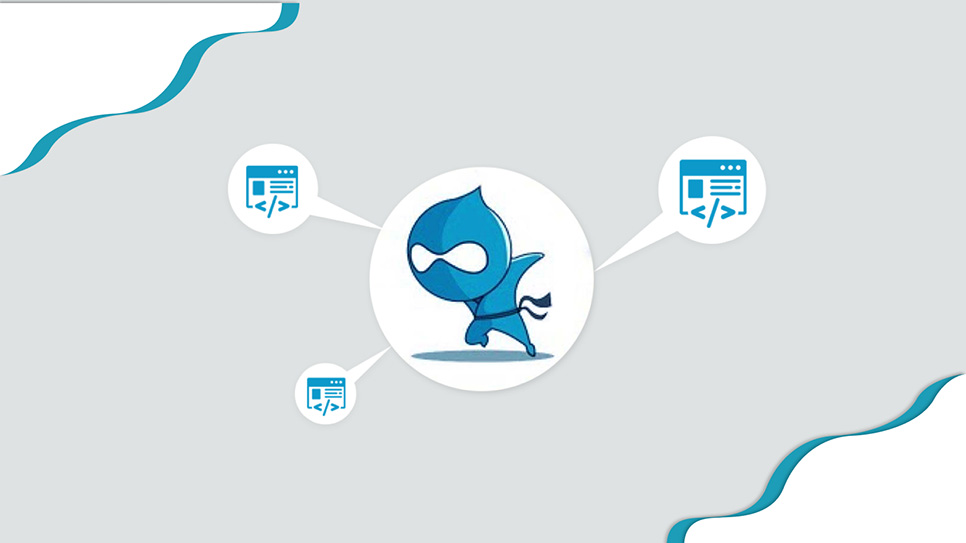Why Decoupled Drupal is the Future of E-Commerce?

If you are working in the e-commerce space, it is hard to miss Drupal, given the high number of CMS Enabled Commerce (CEC) websites built with it. It is one of the most successful CMS for e-commerce websites. The only issue with these sites is that they are decoupled from the CMS backend. This is where Decoupled Drupal comes in. It is a Drupal development approach that separates the frontend and backend with the help of a JavaScript framework like AngularJS or Reacts.
Today, this article will discuss how decoupled Drupal is the future of e-commerce and why you should consider using it for your next project. But, before that, we will shed light on a traditional approach known as Monolith.
Monolith- Is it Worth It?
When it comes to software development, different approaches can be taken – the monolith approach being one of them. A monolith approach is where the software developer concentrates on only one piece of software. For example, if you are writing a blog with WordPress, you are using the monolith approach.
This is because WordPress is a single piece of software that does everything from hosting your blog to including all the necessary components required to run a blog.
Monoliths have several benefits, including the following:
- They are easy to work with.
- They are simple to use and maintain.
- They do not require a lot of infrastructures.
On the other hand, there are also several disadvantages to using monoliths, including the following:
- They are very inflexible.
- Every change made to one part of the software takes a long time to propagate to all the other parts.
- They can be difficult to scale.
If you are starting a new project, or if your project is growing rapidly, you may want to consider using a different approach, such as microservices.
Monoliths are a good choice for small projects or projects that are not expected to grow in the future, but you should consider using a different approach for larger or rapidly growing projects. And for your next large project Decoupled Drupal can be the best choice.
What is Decoupled Drupal?
Decoupled Drupal is an architectural pattern in which the presentation layer of the website is completely separated from the Drupal backend.

In Decoupled Drupal, both front-end and back-end are developed with different technologies.
The front-end can be developed with AngularJS, ReactJS, or any other technology while the backend can be developed with PHP, Java, or any other technology.
Decoupled Drupal Architecture
There are three main ways to design a decoupled Drupal architecture:
A “headless” or “decoupled” approach, where the front end is built with JavaScript and consumes data via an API.
A “split” approach, where the front and back ends are hosted on different domains or servers.
A “hybrid” approach, where the back end and front end share a Drupal instance and communicate via JavaScript, but client-only features are built with Angular.
Decoupled Drupal with an API
The headless or decoupled approach is the most common way to build a decoupled Drupal architecture. In this case, the front end is built with JavaScript and consumes data via an API.
Split Approach
The split approach is another way to design a decoupled Drupal architecture. In this case, the front end and back end are hosted on different domains or servers.
Hybrid Approach
In a hybrid decoupled Drupal architecture, the front and back end share a Drupal instance but communicate via JavaScript. In this scenario, the back end is a data service that returns JSON from Drupal.
Let’s have a look at Decoupled benefits:
The Decoupled Advantage
Increased Flexibility and Agility
With a decoupled CMS, you can more easily make changes to your site’s design or functionality. This is because the CMS and the front-end are separate, so you can make changes to one without affecting the other.
Easier Implementation of Content Changes
You don’t have to write any code because the CMS is already hooked into the front-end. This makes it much easier to make changes to your content and means you don’t need any coding skills.
Better Search Engine Optimization (SEO)
A decoupled CMS is built to give search engines what they want, which is fast-loading, easily indexable content. This means your site will rank higher in search engine results pages (SERPs), providing you with more traffic and leads.
Enhanced Website Performance
Because the front-end and back-end are separated, your site will load faster because there are no extra requests to fetch content from the CMS.
Improved Website Security
A decoupled CMS keeps the content management system separate from your public-facing website, which means that if one is compromised, the other is not. This reduces the risk of hackers being able to target your site’s CMS or inject malware into it.
We don’t miss the current trends and here it is:
Paas (Platform as a Service)
The current trend is to use cloud-based platforms like Amazon Web Services(AWS) to host decoupled sites. Not only does using a PaaS take the hassle of managing infrastructure away from developers, but it also provides high scalability and high availability. There are different types of Paas that you should be aware of too.
In the case of decoupled Drupal-based e-commerce websites, using a PaaS has significant benefits as they allow for easy deployment of websites.
Another key benefit of PaaS is that developers are not required to have any server-side programming expertise, which allows them to focus all their attention on the front end of the website.
Let’s Wind Up
Decoupled Drupal could be the future of the e-commerce industry. The most popular CMS on the web today, WordPress, has dedicated plugins for WooCommerce and other commerce platforms that enable users to quickly sell products online.
However, these systems are highly integrated with WordPress’s backend architecture, requiring an expert developer who understands how to properly implement both.
LN Webworks offers a wide range of services, including decoupled Drupal development, so you can start selling without sacrificing your website’s stability or SEO rankings.
